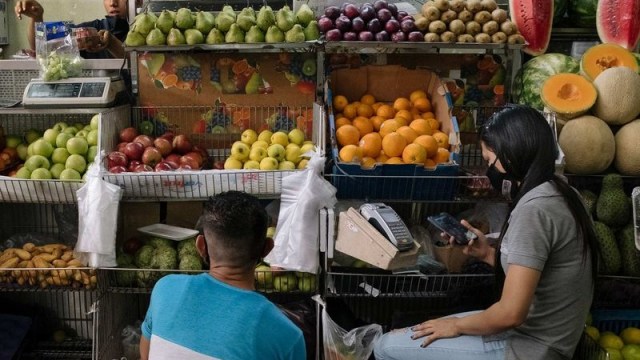
The money transfer app provides relief from runaway inflation and a worthless currency.
By Bloomberg – Andrew Rosati, Alex Vásquez and Jennifer Surane
Nov 11, 2020
When Federico Suárez made an overnight trip to Valencia last month to visit his boyfriend, the 24-year-old Caracas-based lawyer was in the mood to splurge. Over the course of a weekend, the couple enjoyed an empanada breakfast, shopped for imported cheeses and pasta, and then went out for a romantic sushi dinner.
All were purchased using Zelle, the money transfer service owned by a group of seven of the largest U.S. banks. “I can pay for things everywhere. The only problem is, I buy more than I should,” says Suárez.
PayPal and Venmo may have achieved the status of verbs in the U.S., but in Venezuela, it’s Zelle – or “Zell-ey” – that’s on everyone’s lips. Across Caracas, homemade signs that read Aceptamos Zelle (We accept Zelle) dangle in store windows and off produce stands. Computer printouts of the purple company logo are taped to cash registers in supermarkets, some of which have dedicated lines for customers paying with the app. The improvised signage is a hint that Venezuelans’ use of Zelle to provide relief from a rapidly depreciating currency and runaway inflation, while not prohibited, could certainly be described as off-label.
It works for impulse buys, like a candy bar or a new pair of sneakers, as well as for more essential needs. “Without Zelle, we would have fewer patients,” says Dr. Antonio Farfán, a surgeon at a private clinic in Caracas. “I know it’s meant for occasional payments, but here it’s everything.”
Zelle allows customers of its member banks to send money to friends and merchants, often at no charge, via a mobile phone app. Its owner, Early Warning Services, based in Scottsdale, Ariz., has never promoted it abroad. It’s hard to conceive its owners, which include JPMorgan Chase & Co. and Bank of America Corp., would have picked as a test market a country ruled by a vehemently anticapitalist government and whose economy is in shambles.
Use of mobile payment apps is surging globally amid the coronavirus outbreak, spurred by lockdowns and shoppers’ concerns about becoming infected through the use of cash or credit card readers. Zelle, a leader in the U.S. peer-to-peer payments market, logged 842 million transactions totaling $217 billion through September, a 64% increase from a year ago. Early Warning Services declined to make executives available to be interviewed for this story. Ecoanalítica, a local consulting firm, estimates that 17% of transactions at retail establishments in Caracas go through the app and that other Venezuelan cities are seeing similar usage levels. The actual figure may be larger, considering the data do not include smaller shops.
Venezuelans’ embrace of digital money is less a matter of choice than of necessity. Their own currency, the bolívar, is now about as valuable as Monopoly money, a casualty of mismanagement by Nicolás Maduro’s socialist government, which since taking office in 2013 has presided over seven consecutive years of economic contraction. Gross domestic product is one-fifth what it was when his tenure began, according to estimates by the International Monetary Fund, while inflation, as measured by a Bloomberg index pegged to the price of a café con leche, is running above 4,000%. The largest currency note, the 50,000-bolívar bill, is equivalent to less than a dime.
A disastrous 15-year experiment with capital controls gave rise to a thriving black market for dollars. Maduro’s government initially turned a blind eye when corner stores, restaurants, and hair salons began accepting greenbacks as tender. Then last year the president publicly endorsed use of the gringo’s money, partly in the hope that it would help tame inflation and help stabilize a crumbling economy. “I don’t see it as a bad thing?…?this process that they call ‘dollarization,’?” he said during a November 2019 TV broadcast, adding, “thank God it exists!” Ecoanalítica estimates that more than 60% of all transactions in Venezuela are now in dollars.
Several countries have officially adopted the U.S. dollar as their currency, including Ecuador and Turks and Caicos Islands. Venezuela, on the other hand, is an example of what economists call spontaneous dollarization. “The government doesn’t tell you, many times it’s even illegal,” says Steve Hanke, a professor of applied economics at Johns Hopkins University and an expert on hyperinflation. “It happens big time if you have sanctions or occupying armies.”
The Trump administration has made no secret of its desire to enable regime change in Venezuela, but it’s refrained from dispatching U.S. troops to the South American country. Instead it’s targeted Maduro, along with approximately 140 current and former government officials and entities, with sanctions.
Greenbacks are also in demand on the streets of Havana and Tehran, but in those places sanctions effectively cap the availability of dollars to what can be brought in by tourists or visiting expats. Unlike in those other pariah states, digital dollarization via services such as Zelle has been able to take off in Venezuela because its citizens enjoy continued access to the U.S. financial system, says Darshak Dholakia, a partner at Dechert LLP in Washington, D.C., who advises companies on sanctions compliance. “Venezuela is in a very unique position of being the only country currently in which the government is subject to comprehensive sanctions but private people are not,” he says.
About 8% of adult Venezuelans have a foreign bank account or access to an e-wallet, according to Caracas pollster Datanálisis. But that number is magnified by the almost 5 million who’ve fled their country’s crisis, with hundreds of thousands settling in the U.S.
…
Read More: Bloomberg – Zelle has turned Dollar-Starved Venezuela into a cashless test lab
…